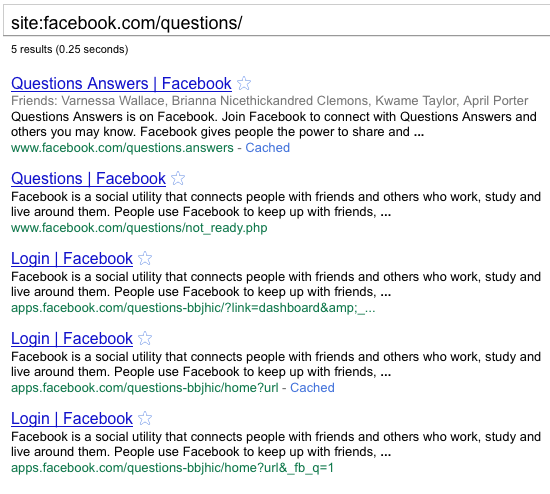Facebook: No Plans To Give Search Engines Access To Facebook Questions
That’s one of the big questions people are asking after yesterday’s launch of Facebook Questions. While many have assumed the answer would be “yes,” a Facebook spokesperson tells us that assumption is wrong. Currently, search engines cannot access questions and answers through our Questions product. That may be something we consider for the future but […]

That’s one of the big questions people are asking after yesterday’s launch of Facebook Questions. While many have assumed the answer would be “yes,” a Facebook spokesperson tells us that assumption is wrong.
Currently, search engines cannot access questions and answers through our Questions product. That may be something we consider for the future but have no current plans to allow it.
Facebook is blocking search engines by only showing Questions to logged-in users. Sure enough, a site:facebook.com/questions/ search on Google shows only a handful of results, none of which are actually Q&A from the first 24 hours that the beta has been open.
The same search produces zero results on both Yahoo and Bing.
Facebook’s move is unusual. As far back as 2007, the company was starting to open up some content to search engines — a trend that’s continued more recently with various agreements to let search engines access certain user content. For years, Yahoo Answers has been a pretty formidable rankings powerhouse, and no doubt gets a substantial amount of traffic via search engines.
It’s odd that Facebook would want to ignore that traffic source entirely. Don’t be surprised if this policy changes.
Postscript, July 30: Experian Hitwise has responded to my claim near the end of this article about how much traffic Yahoo Answers gets via search engines. In a tweet this morning, Hitwise reports that “62% of upstream visits to Yahoo Answers came via Google last week.”
Contributing authors are invited to create content for Search Engine Land and are chosen for their expertise and contribution to the search community. Our contributors work under the oversight of the editorial staff and contributions are checked for quality and relevance to our readers. The opinions they express are their own.
Related stories
